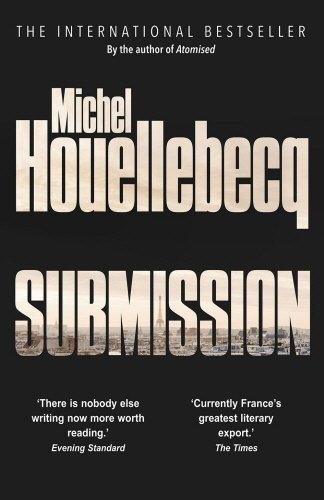 “So this is how liberty dies,” says Deanna Troy, a character in Rod Serling’s famed sci-fi series Babylon 5. “With thunderous applause.” Submission is set in near-future France, where an Islamic party of Wahhabist mien has ascended to power. Various European features like women’s rights are being clawed back, and the country is beginning to de-Westernise.
“So this is how liberty dies,” says Deanna Troy, a character in Rod Serling’s famed sci-fi series Babylon 5. “With thunderous applause.” Submission is set in near-future France, where an Islamic party of Wahhabist mien has ascended to power. Various European features like women’s rights are being clawed back, and the country is beginning to de-Westernise.
The book is called “Submission”, not “Rebellion”. Expected notes of defiance or insurrection aren’t found here. Nobody hides a dagger inside a niqab or hijab. The heart of the matter is this: Michel Houellebecq doesn’t think Western culture is worth saving. His take on an Islamist takeover of France is something like “good, you deserve it.”
The main character is incidental: a middle-aged literature professor who lays pipe in various female students (apparently Houellebecq wasn’t very successful with the fairer sex when he was young. He’s certainly making up for lost time in the pages of his books). Blearily, as if through a panopticon, we see the political stormclouds rattling France. In order to obstruct a right-wing takeover, France’s Socialist party is allying with the Muslim Brotherhood, turning them from a wedge party to an actual force. Soon, Francois sees the future: Islamist Mohammed Ben-Abbes will be president of France.
Scenes of Francois’s daily life are deliberately flat and empty, like slashed tyres. Things like microwaving dinner end up being little manifestos of ennui. Houellebecq hits you hard with pointlessness of it all, and although he almost superglues his tongue inside his cheek (one of the places Francois stays is the site of the Battle of Tours in 732 ad), it’s hard to call this book satire, unless it’s satire with an incredibly broad target: like western civilization or perhaps sentient life as we know it.
The book came out on the 7th of January. On the same day, two Al-Qaeda shooters blessed and culturally enriched eleven magazine publishers in France. For all Houellebecq’s contempt for Islam (“the stupidest religion”, as he says), it’s never dealt with him as it has with Charlie Hebdo, or even Salman Rushdie. Indeed, it’s mostly his fellow westerners that have caused him problems, charging him with hate crimes and forcing him into exile and all the rest of that business.
On one hand, Islam occupies a central role in Submission. On the other hand, it’s hardly in the book at all. French decadence is Houellebecq’s real target. Islam, as he sees it, is just a memetic predator in a world full of memetic predators – it’s the responsibility of guards to stay at their posts and keep the predators out. And France has found her guards asleep at their posts.
After Charlie Hebdo, I assume people rushed out to buy Submission, expecting solidarity and French pride and saber-rattling, and were a little surprised by what they got.
It’s not that Houellebecq’s writing is dark. Lots of writers are dark. The thing is that you never know where you stand with Houellebecq, or are sure of what he’s truly saying. I don’t mean that in an obscurantist postmodern sense. I mean it in the sense of Hitler’s quote “You will never learn what I am thinking. And those who boast most loudly that they know my thought, to such people I lie even more.” Houellebecq’s work is full of crypto-Marxist and crypto-reactionary asides and allusions, like squid ink to conceal his true views. What, finally, is Houellebecq’s stance? That France needs to recover its spine? That’s too easy.
His mind is a black box, and so is this book.. In the end, the only thing I can draw from the soil of Submission is that France can probably no longer with saved. He’s a bit like Martin Amis, who was born in the UK but has permanently relocated to the US. Sometimes you can take the jungle out of the boy.
No Comments »
Comments are moderated and may take up to 24 hours to appear.
No comments yet.
